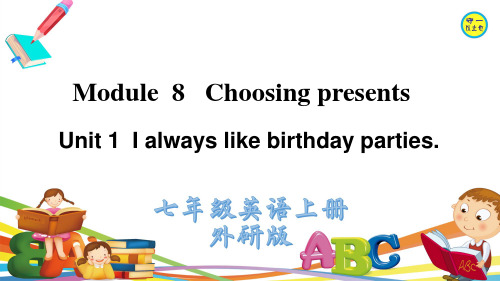外研版-英语-七上-Module8 模块主题写作八
- 格式:docx
- 大小:301.18 KB
- 文档页数:4

外研版七年级上册Module 8 unit1 I always like birthday parties教案外研版(小学三年级起点版)英语七年级(上):Module 8 Unit 1 I always like birthday parties1、教学课型:听、说。
2、教学目标:1.重点词汇和短语:card, party, present, would, always, great, cake, never, special, eat, give, sing, happy, secret.2. 重点句子1) Would you like to come to my birthday party2) I always like birthday parties.3) What do you usually do at a Chinese birthday party4) My mother never makes a birthday cake.5) We sometimes give birthday cards.三、教学重点、难点:1.频度副词的使用及在句中的位置。
2.动词第三人称单数形式。
四、教学过程:Step 1 Warming-up1. Show some pictures of birthday and say what they are.Key words:birthday , birthday card , birthday party , birthday cake , birthdaypresents , have a party , make a cake , eat noodles, eat birthday cake, sing Happy Birthday song…2. Match the words with the pictures.3. Read the words after the teacher.4. Introduce the new words.5. Enjoy a song: Happy birthday.Step 2 Listening practice.1. Make sure the students understand the symbols they must use to complete the chart2. Play the recording through once while they just listen.3. Ask the students to listen to the recording.4. Play the recording again, then they can check their answer with a partner.5. Call back the answer from the whole class and check the answer.Step 3 Work in pairs.Say what you always / usually / often / never do on your birthday.1. Read through the verbs and have the students repeat them. Make sure they understand them.2. Ask the students to think about what they do, and make a list using the adverbs of frequency individually.3. Pair them to talk about what they do.4. Call back the answer from the whole class and check the answer.Step 4 Listen and read.1. Ask the students to read the conversation silently.2. Play the recording and ask the students to listen and read the conversation.3. Read the conversation.4. Act it out.Step 5 Check (√) the true sentences.1. Ask the students to read through the sentences and have the students follow and /or repeat.2. Play the recording again, then they can check their answer with a partner.3. Call back the answer from the whole class and check the answer. Keys:1. √2. ×3. ×4. √5. ×4. Correct the false sentences.5. Call back the answer from the whole class and check the answer.Step 6 Underline the correct words.1. Ask the students to read through the passage.2. Underline the correct words.3. Call back the answer from the whole class and check the answer. Keys: 1. special 2. cut 3. presentsStep 7 Complete the sentences with the words from the box.1. Ask the students to read through the sentences.2. Complete the sentences with the words from the box with a partner.3. Call back the answer from the whole class and check the answer. Keys: 1. always 2. usually 3. never4. sometimesStep 8 Listen and repeat.1. Play the recording once without stopping.2. Ask the whole class to repeat.3. Ask the students to practice the sounds in pairs.Step 9 Work in pairs.Ask and answer like this:—What do you often / usually / always /… do on your birthday—I often / usually / always /… on my birthday.—What do you often / usually / always /… do on Teachers’ Day— I often / usually / always /… on Teachers’ Day.Step 10 SummaryAsk the students to summarize it.Step 11 HomeworkAsk your friends to come to your birthday party.A: Hi, would you like to…B: Yes…五、教学板书:Module 8 Unit 1 I always like birthday parties一、重点句子1) Would you like to come to my birthday party2) I always like birthday parties.3) What do you usually do at a Chinese birthday party4) My mother never makes a birthday cake.5) We sometimes give birthday cards.二、频度副词:always never sometimes usually。

外研版英语七年级上册Module 8 Unit 1《I always like birthday parties》教学设计一. 教材分析外研版英语七年级上册Module 8 Unit 1的主题是生日派对,主要讨论生日派对的相关话题。
本节课主要让学生掌握一般现在时态的描述,以及如何运用一般现在时态进行日常交流。
本节课的主要内容包括:派对邀请、派对礼物、派对活动等。
通过本节课的学习,学生能够更好地运用英语描述日常生活,提高英语口语表达能力。
二. 学情分析七年级的学生已经掌握了基本的英语语法知识,对日常英语交流有一定的了解。
但是,学生在实际运用英语进行交流时,还存在一定的困难,特别是在口语表达方面。
此外,学生对生日派对的认知主要停留在中文层面,需要通过英语学习,将中文认知转化为英文表达。
三. 教学目标1.知识目标:学生能够掌握一般现在时态的描述,并运用一般现在时态进行日常交流。
2.能力目标:学生能够听懂、说清关于生日派对的英语对话,提高英语口语表达能力。
3.情感目标:学生能够感受到生日派对的氛围,增进同学之间的友谊。
四. 教学重难点1.重点:一般现在时态的描述,关于生日派对的英语对话。
2.难点:一般现在时态的运用,生日派对相关词汇的掌握。
五. 教学方法1.情境教学法:通过设定生日派对的情境,让学生在实际环境中学习、运用英语。
2.交际教学法:引导学生进行角色扮演,进行生日派对的英语对话。
3.任务型教学法:学生分组完成生日派对的相关任务,提高团队合作能力。
六. 教学准备1.教学材料:外研版英语七年级上册Module 8 Unit 1教材。
2.多媒体设备:电脑、投影仪、音响等。
3.教具:生日蛋糕、礼物、派对装饰等。
七. 教学过程1.导入(5分钟)教师通过展示生日派对的相关图片,引导学生谈论生日派对的话题,激发学生的学习兴趣。
教师提问:“Do you like birthday parties? Why?”,学生回答,初步了解生日派对的概念。

模块综合检测(八)Module 8(45分钟100分)第Ⅰ卷(共40分)Ⅰ. 听力(10分)(Ⅰ)录音中有五个句子, 听一遍后, 选择与之相符的图片。
(5分)(Ⅱ)录音中有两段对话, 听两遍后, 选择最佳答案。
(5分)听第一段对话, 回答第6、7小题。
6. Whose birthday is it today?A. It is Tony’s birthday.B. It is Lingling’s birthday.C. It is Betty’s birthday.7. What does Betty get from her friends?A. A birthday card.B. A lot of birthday presents.C. A birthday cake.听第二段对话, 回答第8~10小题。
8. Where are John and Mike from?A. They are from England.B. They are from America.C. They are from China.9. Who likes swimming very much?A. John.B. Mike.C. John and Mike.10. What do John and Mike like doing?A. They like playing basketball.B. Football is their favourite sport.C. They like playing table tennis.Ⅱ. 单项选择(10分)1. —your friend like playing badminton? —No, she . She likes playing table tennis.A. Do; don’tB. Does; doesn’tC. Do; do D Doesn’t; does2. —What a new bike?—OK. Let’s give a new bike her.A. about; forB. about; toC. is; toD. is; to3. —Do you like watching TV, Kate?—Yes, I TV in the evening.A. never watchB. watch oftenC. watch usuallyD. always watch4. My parents like sport. favourite sport is walking.A. TheirB. HisC. HerD. They5. —Would you like to go shopping with me, Kangkang?—.A. No, I’d like toB. No, I can’tC. Sorry, I’m afraid not, I have to do my homeworkD. Yes, I like6. Every day I spend two hours my homework.A. finishing doingB. to finish doingC. to finish to doD. to finish do7. me carefully, boys and girls. Can you me clearly?A. Listen to; hear fromB. Hear; listen toC. Hear; hearD. Listen to; hear8. —Do you often your father?—Yes, I get a letter from him every week.A. hear fromB. come fromC. talk withD. work with9. David doesn’t like birthday cakes birthday cards, but he likes parties.A. andB. orC. tooD. with10. (2012·济南中考)—How often do the students play sports? —.A. Twice a dayB. Since last nightC. For two hoursD. A month agoⅢ. 完形填空(10分)Hello! I’m Lina. I am ten years old. I 1 atwin(双胞胎)sister. 2 name is Linda. She’s 3years old, too. Our 4 are on September 16th.Linda and I 5 our birthdays very much. Do youknow 6 ?On that day, our 7 give us some nice presents. Our mother usually 8 a big cake for us. Linda and I both(两者都)like 9 . On that day, my father usually buys two white T-shirts for us. Linda and I both love 10 . Of course, on September 16th, we usually go to the cinema.1. A. has B. uses C. have D. use2. A. His B. Her C. Our D. Their3. A. two B. three C. five D. ten4. A. names B. numbersC. birthdaysD. classrooms5. A. want B. like C. need D. ask6. A. how B. when C. what D. why7. A. friend B. parentsC. grandparentD. teacher8. A. makes B. washes C. lives D. wants9. A. blue B. red C. white D. green10. A. English B. art C. music D. filmsⅣ. 阅读理解(10分)Mary is having a birthday party. There will be acake with candles. Some people will(将要)bringbirthday presents. Let’s look at birthdays in somedifferent countries around the world.Argentina: Ear pulling. They will pull your ear one time for each year of your age. If you are 13, they will pull your ear thirteen times.Denmark: Flag. If it is your birthday in Denmark, a flag will fly outside a window of your home.Philippines: Colored lights. Some people put colored lights outside their home if someone is having a birthday.Russia: Birthday pies. Many Russian children get a birthday pie, not a birthday cake.When you have a birthday, here is a message for you—Happy Birthday from all around the world.1. In Argentina, what do children get on their birthday?A. A cake with candles.B. Ear pulling.C. Ears.D. Flag.2. In Denmark, if it is your birthday, what will fly outside your window?A. A flag.B. A cake.C. Some lights.D. A birthday cake.3. In Philippines, what do some people put outside their home on their birthday?A. A flag.B. Birthday pies.C. Colored lights.D. Message.4. How many times they will pull your ear if you are having your sixth birthday in Argentina?A. Thirteen times.B. Sixteen times.C. Sixty times.D. Six times.5. What can Russian children get if they are having a birthday?A. A birthday pie.B. Colored lights.C. Ear pulling.D. A birthday cake.第Ⅱ卷(共60分)Ⅴ. 根据句意及首字母或汉语提示完成单词(10分)1. My friend, Jenny, usually w white shirts.2. —How old are you?—Oh, it’s a s!3. Danny and Mike often (选择)presents for their friends.4. Her aunt has got two (围巾).5. Students usually do eye (锻炼)every day.Ⅵ. 句型转换(10分)1. My mother often goes shopping. (改为否定句)My mother often shopping.2. She often reads books on weekends. (改为一般疑问句)she often books on weekends?3. My uncle lives in Shanghai. (对画线部分提问)______ ______ your uncle ?4. Tom sometimes goes to the concert with his parents. (对画线部分提问)______ ______ Tom sometimes with his parents?5. She sleeps seven hours every day. (对画线部分提问)______ ______ hours she every day?Ⅶ. 补全对话(10分)从方框中选择最佳选项完成对话, 有两项多余。



学历案设计模板学习主题七上Module8 Unit1 I always like birthday parties.课型听说课时1设计者课标要求课标摘录义务教育《英语课程标准》语言技能三级标准:听:能听懂有关熟悉话题的语段和简短的故事。
说:能与教师或者同学就熟悉的话题(如学校、家庭生活)交换信息。
读:能读懂小故事及其他文体的简单书面材料。
课标分解学什么:词汇知识:card, party, present,would, always, great, cake, never, special,cut,give, sing, happy, secret;语篇知识:关于“邀请朋友参加生日聚会”的对话信息;词汇知识:结合图片认读本课时相关词汇;语篇知识:多层听、读,准确提取话题细节信息;说练结合内化信息并完成输出;学到什么程度:词汇:会读、会写、会译、会用;语篇:能识别对话主题,并能记录和提取对话中的细节信息;围绕主题信息能展开对话交流并能简单复述文章。
教材分析【What】本模块第一单元的话题是邀请朋友参加自己的生日聚会,内容涉及中国孩子和外国孩子如何过生日,对话呈现的是大明在家里庆祝生日所做的事情。
【How】本单元以对话的形式呈现,使用本模块的语法--频度副词,Daming、Lingling、Tony和Betty谈论了在中国庆祝生日的做法。
【Why】通过学习本段对话,让学生了解国内外的生日文化,比较中西方生日文化的不同,并借此培养和提高学生的跨文化交际意识。
学习目标通过本课时学习,学生能够:1. 通过课前读词和看图猜词,能正确拼读present, would, always, never, special, cut, secret等单词。
2.通过梯度的听力训练,能准确获取生日聚会的时间、地点、习俗等信息,并围绕信息展开读说训练。
3.借助表格信息提示简述对话内容。
4.了解更多不同的文化差异,学会尊重他人的生活方式。
本模块以“礼物”为话题,谈论和介绍赠送或接受的礼物,并用频度副词描述某人的喜好。
假如张亮是你的好朋友,今天是他的生日。
请写一篇短文,描述他的喜好及在生日时收到的礼物。
不少于60词。
词汇:
1.礼物________________
2.晚会;聚会________________
3.蛋糕________________
4.特别的;特殊的________________
5.围巾________________
6.去听音乐会________________
7.去看电影________________
8.看足球比赛________________
句型:
1.His/Her parents have a birthday party for him/her. 2.He/She likes…and often…
3.He/She sometimes…but never…
4.…buy/buys…for him/her.
5.…give/gives…to him/her.
高分模板
Today is Zhang Liang's birthday. His parents have a birthday party for him at home.
Zhang Liang likes music and he ①often listens to music after school, ②but he never goes to concerts, so his father buys some CDs of his favourite songs for him. He sometimes plays football, so Jack buys him a nice football. Zhang Liang likes cakes, so I give him a big cake.
③Zhang__Liang__is__very__happy__today!
名师点评
①频度副词often, never, sometimes的使用体现了作者对本模块重点词汇的灵活运用。
②连词but和so的使用使文章衔接自然,结构紧凑。
③作者以一个简单的句子结尾,描述了张亮的愉快心情,升华了文章主题。
凯特是你的好朋友。
她的生日就要到了,你和朋友们准备送给她一些生日礼物。
请就此写一篇60词左右的短文。
要点提示:1.凯特喜欢看书、听音乐、打篮球;
2.我、杰克和简打算每人送她一份礼物。
________________________________________________________________________
________________________________________________________________________
________________________________________________________________________
________________________________________________________________________
________________________________________________________________________
详解详析
【素材积累】
词汇
1.present/gift 2.party 3.cake
4.special 5.scarf 6.go to concerts
7.go to the cinema
8.watch football matches
【小试身手】
One possible v ersion:
Kate is my good friend. Her birthday is coming. She always likes birthday parties.
She likes reading books, so I want to choose a good book for her. Music is her favourite, but she never goes to concerts, because the tickets are very expensive. Jack wants to give her a concert ticket. Kate also likes sports and she usually plays basketball. So Jane wants to give a basketball to her.
Kate is always happy on her birthday.。